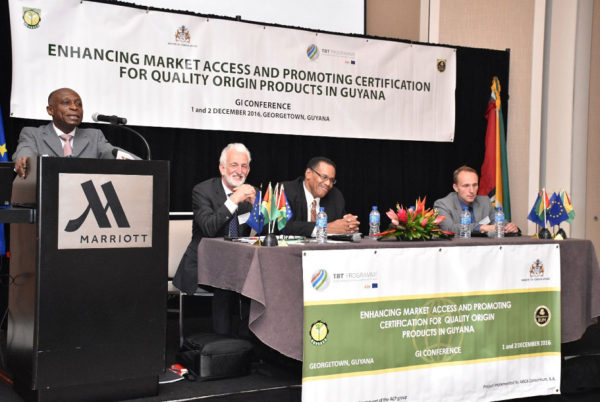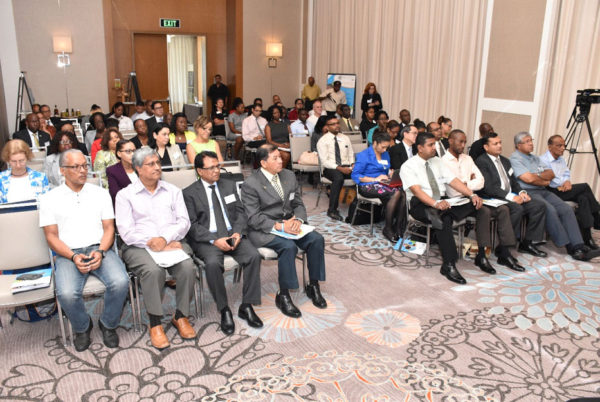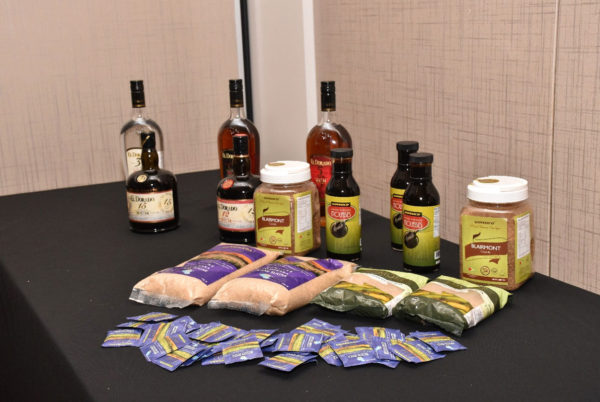The Commercial Registry here has received three applications for the registration of the name Demerara as a Geographical Indication (GI), GINA said.
The three applications are for Demerara Sugar, Demerara Molasses and Demerara Rum. Minister of Foreign Affairs Carl Greenidge said that recapturing the name provides opportunities for producers to obtain market recognition.
“GI protection for those products means that a given name, Demerara, can only be used for products made or originating in Guyana and if production is moved out of Guyana they will no longer enjoy that domain feature,” Greenidge stated at the opening of the GI Conference at the Marriott Hotel, Kingston, yesterday.
GINA said that the two-day conference, hosted by the Ministry of Foreign Affairs, is being held under the theme “Enhancing market access and promoting certification for quality origin products in Guyana.”
According to GINA, the project is being funded by the European Union (EU) through the ACP-EU TBT (Technical Barriers to Trade) Programme. The conference seeks to establish the foundations for the development of the legal protection of geographical traditional names for quality products from Guyana.
Greenidge stated that Article 145 of the EU Economic Partnership Agreement (EPA) makes provision for the protection for geographical indications however; products must first be protected in its own country.
The Minister noted that Guyana currently is not benefiting from this provision since there are no registered GIs locally.
“Geographical Indications are now therefore developing quite fast they represent an important instrument for trade, rural development, protection of knowhow and tradition as well as products promotion and tourism,” GINA quoted Greenidge as saying
Meanwhile, CARICOM’s Assistant Secretary General for Trade and Economic Integration, Joseph Cox noted that GIs are essential to enabling Caribbean countries to compete on international markets. Cox noted that there are already products within CARICOM that show the need for legal protection of these products.
Guyana’s move to acquire the legal right to the Demerara name prevents the usurpation of the value of the products. “The work here in Guyana will therefore give significant impetus to our progress across the region with the application for three Geographical Indications,” Cox stated.
Governments here have been criticised for not taking decisive steps to have Demerara, which has been associated for decades with sugar here, recognised as a geographical indication under the World Trade Organisation framework.
The Guyana Sugar Corporation (GuySuCo) which was present at yesterday’s conference has lost several legal battles overseas in relation to the usage of Demerara to describe its sugar.
In March last year GuySuCo’s ongoing legal woes with Bedessee Imports Ltd came to an end as it was found that the latter was legally entitled to use the mark of Demerara Gold on its products in North America.
A statement on GuySuCo’s website had said then “Going forward, it is expected that Bedessee will continue to use the mark on cane sugar products within Canada, Mexico and the United States, whereas GuySuCo will continue to use the mark elsewhere in the world.”
The state-owned corporation said it is “satisfied” with the outcome stating that Bedessee was the first to use the mark Demerara Gold on cane sugar products in Canada and the United States.
The announcement by GuySuCo was made quietly with the corporation posting a brief statement on its website’s media page.
Bedessee and GuySuCo had been at odds since 2010 when the former sued the latter and the Government of Guyana over the trademark.
According to a ruling in 2010 by Canadian Judge G.R. Strathy “moving rapidly forward well into the 20th century”, Bedessee’s un-contradicted evidence is that it has been using the name ‘Demerara Gold’ as a trademark for sugar and other products in Canada and the United States since at least 1984.
On the other hand GuySuCo’s evidence is that, prior to 2003, its marketing was relatively unsophisticated.
“It sold sugar for export primarily in the Caribbean region, and the sugar was sold ‘nameless’ in unlabeled 50 kg bags with unsophisticated packaging.”
It was in April 2003, according to the judge GuySuCo launched its first branded sugar for the retail trade, which it called ‘Demerara Gold’, the same name used by Bedessee.
According to the background of the case, as provided in the decision seen by this newspaper in 2010, Bedessee Imports Ltd was founded by Lionel Bedessee, who went to Canada from Guyana in 1971.
Then it was difficult to find Caribbean foods in Ontario and Bedessee began to import food from that region. In 1977, he started a retail store selling Caribbean food on Queen Street West in Toronto and from that store, the business has grown and prospered to the extent that at present it operates from a 46,000 square foot warehouse and manufacturing facility in Scarborough. Bedessee Imports Inc. was incorporated on September 23, 1985 to carry on the same business in the United States. It has a warehouse in Brooklyn, New York and a wholesale outlet in Florida, both of which are now managed by the founder’s sons.







